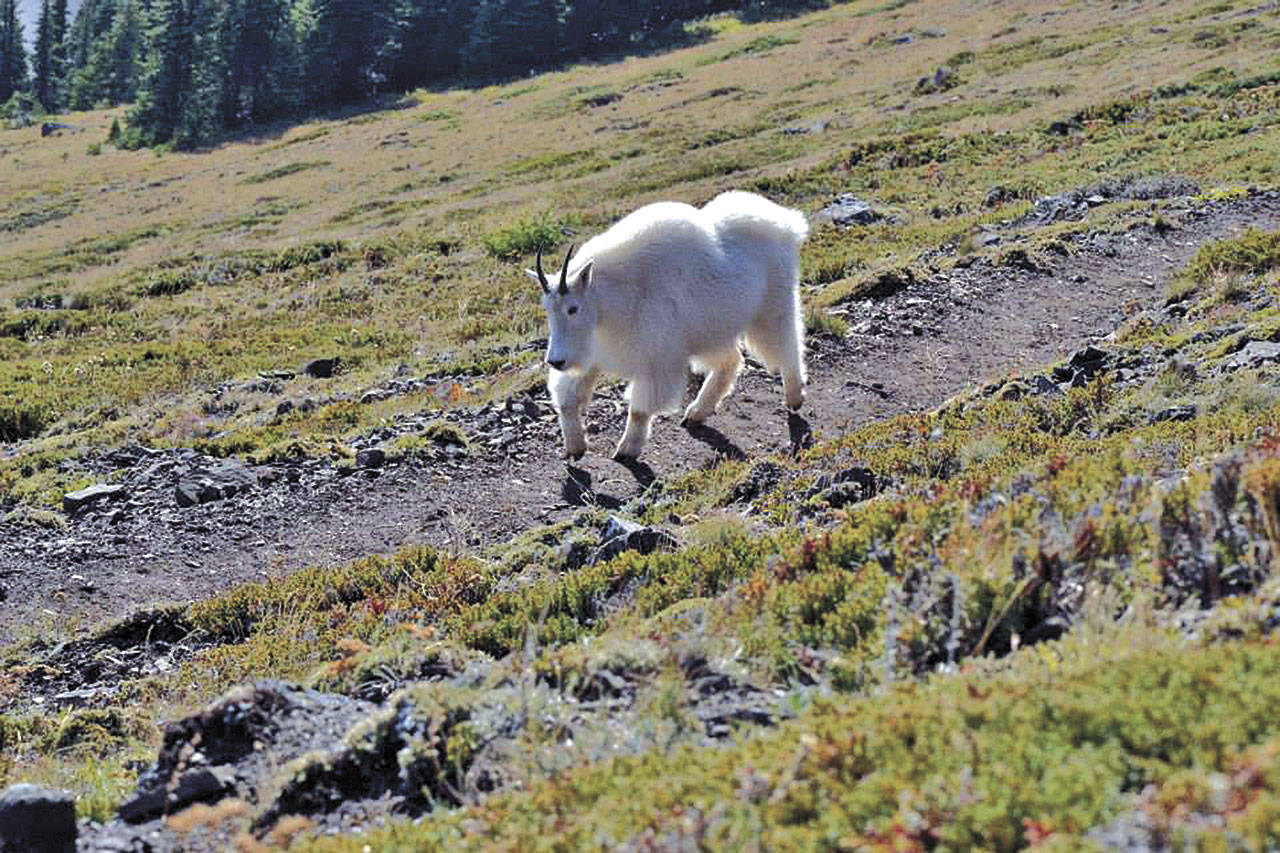OLYMPIC NATIONAL PARK — The public comment period on a draft Mountain Goat Management Plan Environmental Impact Statement has been extended to allow more time for comments from the area where park goats would be relocated under the draft plan.
The comment period, originally set to end Tuesday, has been extended to Oct. 10.
“The National Park Service, U.S. Forest Service, and Washington Department of Fish and Wildlife received a request for an extension to the comment period from state elected officials,” Olympic National Park said in a news release issued Monday.
Park lead wildlife biologist Patti Happe said Tuesday that the request originated from the North Cascades area, where park goats would be relocated under the plan.
“They wanted more time to review and comment,” she said.
Christina Miller, planning lead for Olympic National Park, said the request was from Sen. Kirk Pearson’s office and from Brenda Glenn, the legislative assistant for the office of former Rep. John Koster, who quit in July and for whom a replacement has not been appointed. Both are in Legislative District 39.
“They said that since they may be receiving translocated goats, they requested an extension so their constituents would have more time to provide comments,” Miller said.
The draft EIS, which was released in July, is available for review and comment at parkplanning.nps.gov/olymgoat.
So far, more than 600 comments have been received, the park said in its news release.
Once the comment period ends, National Park Service officials will make a decision, which is slated for this coming spring.
Mountain goat on Klahhane Ridge from Laura Lofgren on Vimeo.
The plan outlines alternatives for moving or killing the non-native mountain goat population in Olympic National Park. That population has grown to an estimated 625 to 675 animals, national park and state Department of Fish and Wildlife officials said during a presentation in August.
The preferred alternative in the proposal is to move goats from the Olympic Peninsula — from both the park and Olympic National Forest — to native mountain goat habitat on the Mount Baker-Snoqualmie and Okanogan-Wenatchee national forests in the Cascade Mountains.
Those that could not be captured would be shot and killed beginning in 2019.
Relocation to the North Cascades to revive the depleted mountain goat population there would occur during two-week periods in July and August-September of 2018 and 2019, according to the August presentation on the draft plan. (The presentation can be seen at http://tinyurl.com/PDN-GoatPresentation.)
The animals would be transported by helicopter to five staging areas — two would be in operation at all times — where they would be handed over to the state Department of Fish and Wildlife, which would airlift the animals in crates for release in the North Cascades.
The plan’s purpose is to allow Olympic National Park to reduce or eliminate environmental impacts from non-native mountain goats and reduce potential public safety issues associated with the animals’ presence in the park.
According to the EIS, the purpose of the project is to reduce the environmental impacts of the mountain goats, which are not native to the Olympics.
Public safety also has been compromised by the increased habituation of the animals, driven to seek out humans and particularly the salt in their urine, Happe has said.
Happe said in August that that behavior culminated in the 2010 fatal goring of Bob Boardman of Port Angeles on Klahhane Ridge in Olympic National Park, although mountain goat-management efforts already were underway.
The preferred plan envisions zero to 50 mountain goats remaining by 2028.
The cost of helicoptering the mountain goats to a staging area and transferring ownership of the animals to state Fish and Wildlife is estimated at “a little bit under $700,000” from 2018 through 2020, Happe said in August.
A third year of funding is provided as a contingency amount that, if not needed, would be spent for lethal removal beginning in fall 2019.
Along with being online, copies of the draft EIS also are available at public libraries including those in Forks, Port Angeles and Port Townsend, and at state Department of Fish and Wildlife offices in Montesano, Mill Creek and Olympia.
Comments can be mailed or hand-delivered to Superintendent, Olympic National Park, 600 E. Park Ave., Port Angeles, WA 98362. They must be delivered or postmarked by Oct. 10. Comments will not be accepted by fax, email or in any other manner, the park said.
________
Executive Editor Leah Leach can be reached at 360-417-3530 or at lleach@peninsuladailynews.com.
Senior Staff Writer Paul Gottlieb contributed to this report.

